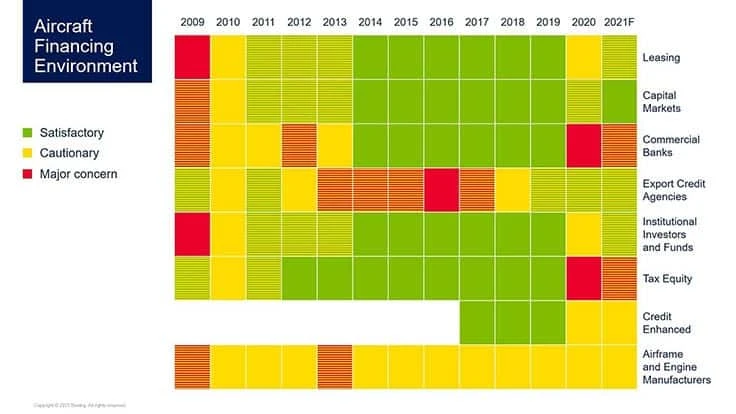
Boeing
Boeing projects global and diversified funding will continue to flow into the aircraft financing sector as the aviation sector navigates the global pandemic and vaccine deployment continues to accelerate.
"Financiers and investors understand the industry's resilience and the long-term fundamentals that make aircraft a valuable asset class," said Tim Myers, president of Boeing Capital Corp. "Despite the unprecedented impacts of COVID-19 on the global aerospace industry, there generally continues to be liquidity in the market for our customers, and we expect it to further improve as travel begins to rebound."
The 2021 Current Aircraft Finance Market Outlook (CAFMO), the first published since 2019, reflects Boeing's near-term view of market dynamics and assesses financing sources for new commercial airplane deliveries. Due to the ongoing impacts of the pandemic, the 2021 CAFMO excludes its customary one- and five-year industry financing projections.
"Industry fundamentals continue to show varying degrees of strength in different markets depending on the regional trends of the global pandemic," Myers said. "We expect that capital will continue to be routed into the sector by established players and as new entrants seek opportunities during the industry's recovery."
The 2021 CAFMO reports the aircraft financing environment ended 2020 with enough liquidity to finance deliveries, but with stresses particularly in the bank debt and tax equity markets. The 2021 CAFMO, an introductory video and regional financing data is available at www.boeing.com/CAFMO. Select highlights include the following:
- At the industry level, commercial aircraft delivery funding volume totaled $59 billion, a 40% decrease from 2019 levels.
- The top sources of Boeing delivery financing were cash, bank debt and capital markets, and 100% of Boeing deliveries were financed by third parties.
- Aircraft lessors executed a significant volume of sale-leaseback transactions, and the industry-wide leased fleet climbed to 46%.
- Capital markets for aviation volumes were 70% higher than 2019.
- Commercial banks shored up the aviation industry's need for liquidity early in the pandemic, but long-term bank debt became one of the less utilized forms of financing.
- Institutional investors and funds continued to seek aviation exposure, stepping up as some financiers paused and sector credit spreads widened.
- Export credit agencies remain a small but important funding source during the pandemic.
- Credit-enhanced financing saw further progress as a complementary funding source, totaling to 4% of the financing mix for Boeing deliveries.
The Boeing 2020 Commercial Market Outlook, a separate annual 20-year forecast addressing the market for commercial airplanes and services, projects passenger traffic growth at an average rate of 4% per year. The global commercial fleet is expected to reach 48,400 by 2039, up from 25,900 airplanes today.
Boeing Capital Corp. is a global provider of financing solutions. A subsidiary of The Boeing Co., Boeing Capital offers asset-backed lending and leasing, concentrating on assets that are critical to the core operations of Boeing customers. Boeing Capital's primary mission is to support the other Boeing business units by ensuring customers have the financing they need to buy and take delivery of their Boeing products.
Latest from Aerospace Manufacturing and Design
- Honeywell, NXP expand aviation technology partnership
- ETCO connectors and terminals for drones
- Vertical Aerospace starts 2025 with piloted thrustborne milestone
- Seco's digital boring heads
- America Makes announces winners of $2.1M project call
- HEULE's GH-K Tool
- Mastercam acquires FASTech
- Amada Weld Tech's AWS3 Pneumatic Active Welding System





